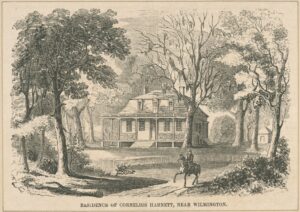First Declarer of Independence
Biography
 Cornelius Harnett, Jr., was born near Edenton, but his family moved to Brunswick Town when he was three. His father Cornelius, Sr., was fleeing charges from a riot he led in defense of the deposed colonial governor. Nothing is known of Harnett’s education, but he was described as well-read. Harnett grew up to become a a plantation owner and a Wilmington merchant with a wide range of business interests. His home “Maynard” was north of town, at Smith’s Creek and the river.[1]
Cornelius Harnett, Jr., was born near Edenton, but his family moved to Brunswick Town when he was three. His father Cornelius, Sr., was fleeing charges from a riot he led in defense of the deposed colonial governor. Nothing is known of Harnett’s education, but he was described as well-read. Harnett grew up to become a a plantation owner and a Wilmington merchant with a wide range of business interests. His home “Maynard” was north of town, at Smith’s Creek and the river.[1]
He started his public service when elected town commissioner and named justice of the peace around age 27. Four years later he was elected to the Provincial Assembly. Harnett was still in it as the Revolution broke out. Along the way he was a leader of the march to confront Royal Gov. William Tryon about the Stamp Act in 1766. Within the assembly he advocated for the reforms demanded by the Regulators, though opposing their violence, and for the colony’s ability, opposed by Parliament, to pursue tax payments from absentee landlords. He helped set up communications with the other colonies as the Revolution approached, and chaired the Wilmington Committee of Safety that took over local government. Harnett was also a leader of the rebels who burned Fort Johnston in 1775, and was elected president of the Council of Safety that took over the N.C. government. He was placed in charge of the committee that drafted the Halifax Resolves, the state’s declaration of independence, and was the first person to read the U.S. Declaration to the public in North Carolina. After helping to write the state constitution, he joined the first cabinet, but then was elected to the Continental Congress against his wishes from 1777-80.
He remained active in North Carolina helping gather supplies and troops for battles further south, writing in 1778, “I am one of those old Politicians who had much rather see my neighbour’s house on fire than my own, but at the same time would lend every assistance in my power to quench the flame.”[2] When Wilmington was surprised by a British corps in 1781, he tried to escape, but did not get far due to gout. He was brought back to town across the back of a horse and became ill in an infamous open jail at age 57. He died shortly after being freed under parole, and is buried at St. James Episcopal Church. Harnett County is named for him.
More Information
- Cornelius Harnett: The Life of Cornelius Harnett, <http://www.corneliusharnett.com/> [accessed 3 November 2020]
- Fonvielle, Chris, ‘With Such Great Alacrity’, North Carolina Historical Review, XCIV.2 (2017)
- Harnett, Cornelius, ‘Letter from Cornelius Harnett to Richard Caswell, Volume 13, Pages 304-306’, Documenting the American South: Colonial and State Records of North Carolina, 1778 <https://docsouth.unc.edu/csr/index.php/document/csr13-0367> [accessed 4 May 2022]
- Lennon, Donald, ‘Harnett, Cornelius, Jr.’, NCpedia, 1988 <https://www.ncpedia.org/biography/harnett-cornelius-jr> [accessed 3 November 2020]
- ‘Marker: D-1’, North Carolina Highway Historical Marker Program <http://www.ncmarkers.com/Markers.aspx?MarkerId=D-1> [accessed 3 November 2020]
[1] Fonvielle 2017. The city’s water treatment plant is on the land today, reached via Cornelius Harnett Dr.
[2] Harnett 1778.



